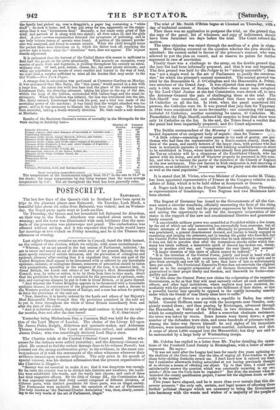The Chartist trials at the Central Criminal Court proceed. More
wit- nesses for the defence were called yesterday; and the Attorney-General re- plied. He seemed to feel the serious damage done to his witness Powell; but pointed out the strong confirmation given to his evidence, in the exact cor- respondence of it with the statements of the other witnesses wherever their evidence turned upon common subjects. The only point in his speech of special interest, was his distinct affirmation that the present organization of the Chartists is illegal—
"Secrecy was not essential to make it so; that it was dangerous was enough. By its rules the country was to be divided into districts and localities; the locali- ties were subdivided into wards, and the wards into classes; and each of these had their respective officers. By the 89th of George III., . the Combination Act, it was expressly enacted that every society composed of different divisions, or different parts, with distinct presidents for those parts, was an illegal society. The Freemasons were excluded from the operation of the act of Parliament. The body known as the National Charter Association ' was, then, clearly, accord- mg to the very words of the act of Parliament, illegal." The trial of Mr. Smith O'Brien began at Clonmel on Thursday, with a day of technical contests. First there was an application to postpone the trial, on the gonad that the copy of the panel, list of witnesses, and copy of indictment, should have been furnished ten days before the trial. The Court refused the motion.
The same objection was raised through the medium of a plea in abate- ment. More fighting occurred on the question whether the plea should be admitted: the contest ended in favour of the prisoner's counsel, who were allowed to put the plea on record, and so reserve its points for further argument in case of conviction.
Finally there was a challenge to the array, on the double ground that the jury-list had been informally prepared, and that it was not impartial. The first ground was held by the Judges to be "utterly untenable "; there was "not a single word in the act of Parliament to justify the construe. tion " for which the prisoner's counsel contended. The second ground was tried by the Honourable G. J. O'Callaghan and the Honourable A. Prittie, two members of the Grand Jury. It was objected that among 288 names only 1-18th were those of Roman Catholics—that many men eulogized by the Lord Chief Justice at the last Commission were struck off, to save the Attorney-General the pain of challenging them at the trial. The Sub-Sheriff was examined, and admitted that there were only about 18 Catholics on all the list. In 1846, when the panel numbered 331 persons, the Catholics were 34. It was proved that jury-lists for Tipperary in 1846 were constituted far more favourably: one containing 192 names, included 51 Catholics; another containing 94 names, 47 Catholics. Mr. Pennefather, the High Sheriff, confessed his surprise to hear that there were only 18 Catholics on the list. In the end, the Triers found a verdict that the panel had been impartially prepared; and the Court adjourned.


























 Previous page
Previous page